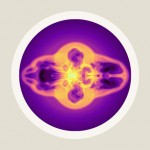Dictionary
dark energy
Comparing astronomical observations with the predictions of the big bang models (which link the properties of matter and the speed of the universe’s expansion), it turns out that more than 70 percent of the density of the universe is supplied by what is called dark energy, a type of energy that is associated with empty space itself. Ordinary matter or energy are conserved when the universe expands: If I have 10 hydrogen atoms in a certain region of space, and if that region now expands to twice its initial volume, it will still contain no more than the initial 10 hydrogen atoms, now spread over the larger volume. On the other hand, the amount of dark energy in that region of space doubles in the process, just as the volume, the “amount of space” is twice as large than it was in the beginning.
There’s another crucial difference between ordinary energy and dark energy. The gravitational influence of ordinary masses and ordinary energy is attractive – it is aimed at pulling all the contents of the universe closer together. Dark energy, on the other hand, acts to accelerate the universe’s expansion. In that way, it is equivalent to a certain type of what is called a cosmological constant.
As yet, nobody knows how (and if) dark energy fits somewhere into our current picture of the fundamental constitutents of the universe, for instance: into the standard model of particle physics or some extension of that model. This makes dark energy one of the greatest mysteries of modern physics.







